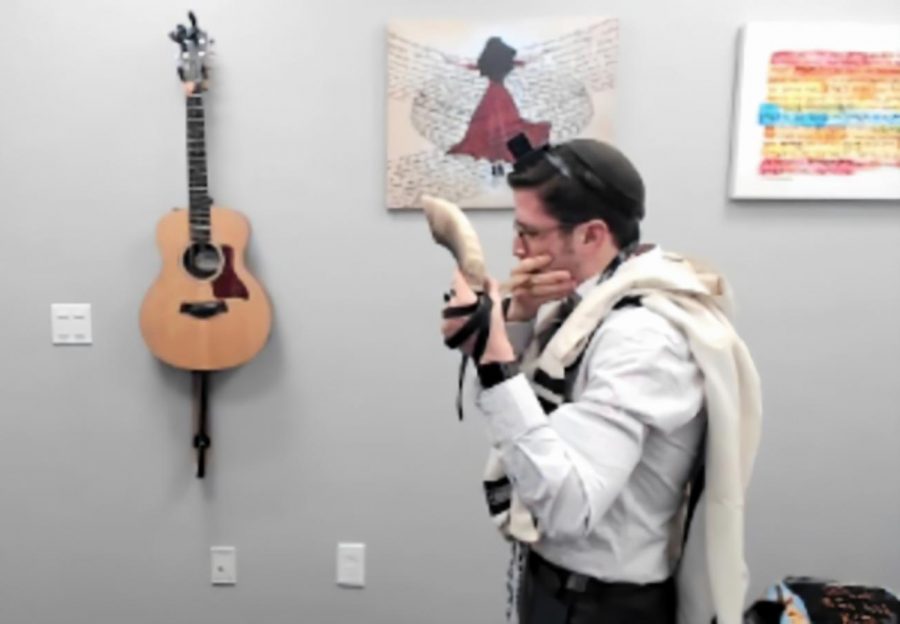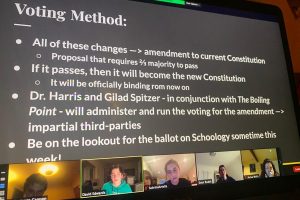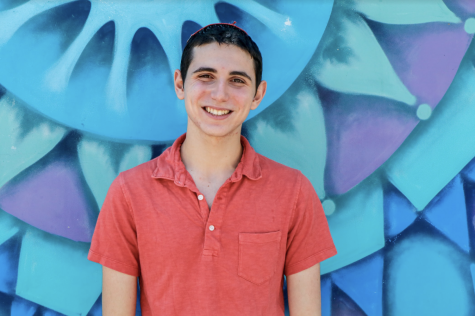Even via Zoom, the shofar signals the season in Elul
With less strict rules than on Rosh Hashanah, it’s a mitzvah you can fulfill using technology.
BP Screenshot by Benjamin Gamson
REMOTE: Rabbi David Block blew the shofar over Zoom for his 10th-grade Talmud class on Sep. 8.
September 15, 2020
Summer is ending. School, in its strange configuration, is revving up. And even in this pandemic year, Jews everywhere are getting ready for Rosh Hashanah, and trying to think about the year that’s passed and the year to come.
Even though there are fewer distractions, and perhaps more anxiety, than in other years, even this year — maybe especially this year — it’s a hard transition.
Enter the shofar — not just on Rosh Hashanah, but the entire month before. Among Jews of every denomination, it has become a minhag, or custom, to hear the shofar throughout Elul, and in Orthodox communities, after weekday Shacharit every single day except Shabbat and the day before the chag.
“The reason is as an awakening call,” said Judaic Studies teacher Rabbi Abraham Lieberman. “Another year has gone by. Fix what you need to fix, try to make yourself a better person.”
Hearing the shofar in Elul, the month leading up to Rosh Hashanah, is actually not a commandment the way it is on the holiday. The actual holiday of Rosh Hashanah is described in Bamidbar as yom teruah yihyeh lachem — “It shall be a day of blowing the shofar for you” (Numbers 29:1) — creating halachic requirements that are very specific concerning how the shofar must be heard on that day.
But Shalhevet rabbis say that while hearing shofar in Elul is still required, there can be more flexibility because it’s based on a custom, not a verse. That is especially helpful this year because most Jews are not able to gather together in daily minyanim and hear the shofar together.
Rabbi Lieberman said that in the current circumstances, those who don’t have a synagogue or minyan to attend in person may, in Elul, hear the shofar over Zoom.
“The listening to the shofar during the month of Elul and the listening to the shofar in Rosh Hashana are two worlds apart,” Rabbi Lieberman said. “So during the month of Elul if a person can’t go to shul or whatever so there’s no shofar, but he hears one [over the internet], its purpose as a custom will be fulfilled.”
In other words, during the pandemic, a person hearing the shofar over Zoom during the month of Elul can receive credit for a mitzvah, he said.
“It is a mitzvah to keep a custom,” said Rabbi Lieberman.
To explain this concept, Rabbi Lieberman quoted the book of Mishlei (Proverbs), which says in Chapter 1, verse 8, which says “Hearken, my son, to the discipline of your father, and do not forsake the instruction of your mother.”
“The rabbis interpreted the idea of [the instruction] of the mother to refer to the Jewish customs that one inherits,” said Rabbi Lieberman.
“So therefore the rabbis said that … customs should be followed, in addition to the 613 commandments, and all the Rabbanans and all the other rabbinic [authorities] you know. There’s a separate mitzvah for one to follow their own custom. They get rewarded for doing a mitzvah.”
This month at Shalhevet, the shofar has been sounded every morning during online davening, which takes place during all first-period classes. Some teachers were blowing the shofar themselves in their Zoom rooms.
And this week, because all students are saying selichot (prayers of repentance) together on a schoolwide Zoom together, Rabbi Block has been blowing shofar on Zoom for the entire school at the end of selichot.
“It’s just a minhag,” or custom, Rabbi Block said later. “There’s no mitzvah or not-mitzvah in doing it right. So you might as well do it over Zoom because there’s no reason not to, because there’s no mitzvah at stake [that could be done wrong].”
Last week, Shalhevet started offering in-person davening for one grade at a time, with freshmen, juniors, and seniors starting Sept. 9 and sophomores, juniors and seniors Sept. 10. Rabbi Block blew the shofar in person, a distance away from the students and with a mask over its end.
Now that there is some in-school davening regularly, Rabbi Block told the Boiling Point that students should come to voluntary in-school davening when it’s offered just to hear it.
“It’s one of the reasons why we’re encouraging people to come to the in-person davening in the morning these days — so everyone could have the opportunity [to hear the shofar],” said Rabbi Block.
Rabbi Lieberman agreed that was a good idea.
“There, it’s a custom and for that you don’t really have to hear the actual voice — the actual noise of the shofar,” said Rabbi Lieberman. “That reminder, that electronic reproduction, is good enough to achieve what it has to do.”
Rosh Hashanah this weekend will follow a different set of rules. Since the mitzvah to hear the shofar is commanded in the Torah, people would not be observing it by hearing the sounds over Zoom.
In a sign of its importance on Rosh Hashanah itself, in addition to backyard synagogue minyans the Orthodox Union (OU) has people volunteering to blow the shofar on different street corners in Jewish neighborhoods including Pico-Robertson, Beverlywood, Beverly Hills and Beverly Grove. For a list of times and locations, click here.















